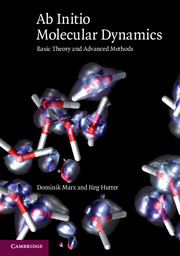Preface
Published online by Cambridge University Press: 28 January 2010
Summary
In this book we develop the rapidly growing field of ab initio molecular dynamics computer simulations from the underlying basic ideas up to the latest techniques, from the most straightforward implementation up to multilevel parallel algorithms. Since the seminal contributions of Roberto Car and Michele Parrinello starting in the mid-1980s, the unification of molecular dynamics and electronic structure theory, often dubbed “Car–Parrinello molecular dynamics” or just “CP”, widened the scope and power of both approaches considerably. The forces are described at the level of the manybody problem of interacting electrons and nuclei, which form atoms and molecules as described in the framework of quantum mechanics, whereas the dynamics is captured in terms of classical dynamics and statistical mechanics. Due to its inherent virtues, ab initio molecular dynamics is currently an extremely popular and ever-expanding computational tool employed to study physical, chemical, and biological phenomena in a very broad sense. In particular, it is the basis of what could be called a “virtual laboratory approach” used to study complex processes at the molecular level, including the difficult task of the breaking and making of chemical bonds, by means of purely theoretical methods. In a nutshell, ab initio molecular dynamics allows one to tackle vastly different systems such as amorphous silicon, Ziegler-Natta heterogeneous catalysis, and wet DNA using the same computational approach, thus opening avenues to deal with molecular phenomena in physics, chemistry, and biology in a unified framework.
- Type
- Chapter
- Information
- Ab Initio Molecular DynamicsBasic Theory and Advanced Methods, pp. viii - xPublisher: Cambridge University PressPrint publication year: 2009



